- Home
- Karen Hesse
A Light in the Storm Page 3
A Light in the Storm Read online
Page 3
This afternoon, the wind pulled at my cloak as I made the quick passage from our quarters to the Lighthouse. I left for the Light early, to keep from hearing my parents argue. I can no longer stop them, no matter how I try.
Keeper Dunne was first to join me in the lantern room. He has been looking gray lately, gray smudges under his eyes, gray smudges under his cheekbones. I fear he is ill.
Father joined us moments later.
“Shall Father and I take your watch tonight?” I asked.
Keeper Dunne shook his head no. “Just need some rest, I think.”
Father guided him toward the head of the stairs, offering again to stand double watch as Keeper Dunne prepared to descend.
“No thank you, John,” Keeper Dunne said. “I’ll leave you two to kindle the Light, though. Just see I’m awake before you go to bed, Amelia.” And he climbed slowly down the stairs, his steps ringing like a dull bell.
As we lit the wicks, I spoke almost in a whisper. “Father, it feels as if the world is coming to pieces.”
Father harrumphed.
I looked down on our house through the lantern glass. Mother used to stand and watch us kindle the lights as night fell. Tonight there was no sign of Mother.
Saturday, January 19, 1861
Clear. Wind N.W. Moderate.
Mother nearly burned the house down last evening, though she doesn’t know it. Father was in the lantern room; he’d come early to relieve me. When I returned to the house, I smelled smoke. Mother had washed my extra stockings for me and hung them by the fire before retiring for the evening. By the time I reached them, my stockings were ablaze. Throwing water on the fire, I put it out quickly. Except for ruined stockings, a scorched fire-board, and a lightly toasted arm, all is well. Another five minutes and we might have lost everything.
Today Mother said she kept smelling smoke. To settle her mind, Keeper Dunne promised he would write the Lighthouse Board and request a visit from the chimney sweep as soon as could be arranged.
Mother insisted we not wait. That we must clean the chimney ourselves.
Father surprised me by agreeing to Mother’s demand. He must still care for her. Why else would he spare her feelings by hiding the truth … that she, not the chimney, had caused the house to smell of smoke.
Tomorrow, though it is the Sabbath, we shall tie several stones onto ropes, climb to the roof, and let the ropes down the chimney, raising and lowering the stones until the worst of the black crisps of soot are scraped off the chimney’s inside walls. We shall have twice the mess to clean when we finish, but Mother should be satisfied.
I wish I could help her somehow. Her moods rise and fall with the pain in her joints, with the battles with Father. Most of the time she simply seems sad. As if she finds no beauty, no joy in this life. How can she live in such a place and not see its beauty?
I love Mother. I want her to feel gay again. To laugh. To be content. But she seems determined to be unhappy with Father and with our position at the Light. I should not say this, and I could not say this to anyone but you, my diary, not even to Uncle Edward, but there are days when I am angry at Mother. Because she is so blind to Father’s goodness, because she hates the Light and the sea.
Sometimes, what I write here is all that keeps me calm. Putting the tumble of anger and fear down on paper gives me power over it. Then I don’t feel so helpless.
I record the wind, the weather, the ship sightings in the Keeper’s log, but here, in my own diary, I write all the rest.
Sunday, January 20, 1861
Clear. Wind N.E. to S.E. Light.
Keeper Dunne led us in prayer this morning. We have reached the lowest point of cold so far this winter, the thermometer standing at 4 degrees.
We cleaned the chimney this afternoon.
No more time to write. The oil congeals and will not pour. I must warm it before I can refill the wells that feed the Light.
Monday, January 21, 1861
Cloudy. Wind S.E. Light.
The sudden rising of the temperature brought relief, even to Mother, who spent the day doing wash.
The only relief it has not brought is to Mr. O’Connell’s bad humor. Reenie’s father has forbidden her from talking with me. This latest outburst, I fear, comes from his presence in Uncle Edward’s store the other day when we were discussing South Carolina. At first Mr. O’Connell threatened to withdraw Reenie from school. But she spent the weekend calming him. She promised she would not listen to any talk of Abolition, from anyone. And in particular she would have no conversations with me. She explained everything to me this morning, quickly, without looking at me once, before she slipped to the back of the procession of Osbournes.
As soon as I returned home from Bayville this afternoon, I worked beside Mother. She had such energy. Her humor was so good. Her knuckles were hardly swollen.
I dare to hope she is recovering and all will be well from now on.
Thursday, January 24, 1861
Clear. Wind S.E. Moderate.
Father and I made the mistake of discussing politics within Mother’s earshot.
She colored and grew angry. “I will not listen to this talk,” she snapped. Without looking back at us, she retreated to her room.
I heard her weeping. Father heard her, too.
A little later, when she grew quiet, I went in to her. She was sitting at her dressing table, gazing at the charcoal drawing of the cottage, which Father has not yet framed for her. I promised I’d row her to the mainland to visit Grandmother this weekend.
“Thank you, Amelia,” she said.
I am heavyhearted. How could Father and I have made such a mistake, when Mother was doing so well?
Tuesday, January 29, 1861
Cloudy and Snow. Wind S.W. Moderate.
A covering of snow has transformed Bayville into a soft, white plain, but here, on the island, the wind blows the snow away before it has a chance to settle. Just now, for the second time on my watch, I have had to inch up the ladder onto the narrow balcony that runs around the outside rim of the Light. The wind blew strong enough to rattle the ladder so that it shifted in the buffeting gusts, even with my weight upon it. Clinging with one hand to the slick balcony rail, I scraped ice and snow from the glass, keeping my eyes averted so as not to be blinded by the flash. Below and beyond, the sea thunders, the wind howls, and the snow has scoured my cheeks and hands with its stinging pins. Clearing ice off the outside of the lantern glass is dangerous; it is the chore that most frightens me. I would rather take on a rescue on the stormy sea than face the ice-slick ladder and the beastly wind.
I hope the glass does not ice up again tonight.
Thursday, January 31, 1861
P. Cloudy. Wind N.W. Light.
Received a delivery of whale oil.
Uncle Edward and I sat quietly in the afternoon and gazed out at the patches of snow remaining from the storm two days ago. I stopped at the Worthingtons’ before coming to Uncle’s. Mrs. Worthington seems to find me too much a reminder of William. I fear my visit made her grief more difficult to bear. Daniel avoids me entirely. Only the little girls seemed pleased when I came. Perhaps I should not visit soon again.
Uncle told me that the states of South Carolina and Mississippi have ordered all their residents to pay a $12 property tax on the head of each and every slave. The rebels figure that’s the best way to raise money to run their new country.
A $12 tax on every slave!
I don’t dare tell Father what else Uncle Edward told me. Uncle and I actually laughed over it, but I’m not certain Father would find it funny. It seems the Delaware senate, in an effort to settle down our hotly divided state, has proposed intermarriage between Southerners and Northerners to hold the Union together. That is what my mother and father have, a marriage between South and North; she from Sussex, the southern-most county in Delaware, and Father from up north in New Castle. They might as well be from Charleston and Boston, as different as they stand on the issues of slavery and
secession. All I can think is the Government had better have another plan in mind, because I do not think this intermarriage idea is going to work.
The paper Uncle Edward read from says now Georgia has seceded from the United States. Dear Lord, if you add Georgia to South Carolina, Mississippi, Florida, and Alabama, we have five states now that have left the Union!
Thursday, February 7, 1861
Cloudy. Wind N.W. Moderate.
A flock of birds hit the glass last night. It must be over four months since the last time. They are blinded by our Light and crash into the lantern room. I hate cleaning up their bodies afterward; all frozen stiff, their necks broken. The dead birds were everywhere this morning, strewn over the ground, piled on the Lighthouse balconies. I discovered a crack in the lantern room glass on the seaward side before I left for school. Reading through the log tonight, I see that Keeper Dunne has made a report. Someone from the Lighthouse Board will come to inspect the damage soon. I hope it won’t be Inspector Howle.
We must get the station sparkling before the Inspector comes. Mother did the scrubbing today while I was at school. She could barely get down on her knees, barely hold the brush when I bid her good-bye this morning. But she worked all day anyway, in spite of the pain in her hands and her knees.
Tonight, though, after my watch, I must retrace Mother’s footsteps and clean all the places she missed because, for the first time, she did not scrub well enough to pass inspection.
Friday, February 8, 1861
Cloudy and Rain. Wind S.E. Light.
Temperature in the fifties.
Saturday, February 9, 1861
Stormy. Wind N.W. Light.
Temperature within one degree of zero this morning.
Monday, February 11, 1861
Clear. Wind W.N.W. Light.
Temperature up around sixty.
Thursday, February 14, 1861
Cloudy and Fog. Wind N.E. Moderate.
Chill again. This restless weather is much like Mother’s moods, high and low, and never a clue as to what each day might bring.
After morning chores I rowed across the Ditch and walked to school with the Osbourne children at my heels. Reenie, good to her word, maintained a safe distance behind.
I miss William Worthington. I see Daniel in passing. He is two years older than I. Daniel has taken his brother’s death hard. Perhaps if we spoke together of William, it would bring comfort to us both.
I did the marketing for Grandmother, filling her cupboards. Grandmother sat in her hearth chair, a blanket up around her neck. She crossed her arms under the blanket and cursed Mr. Lincoln. The bones of her elbows poked inside the blanket like a pair of fishhooks.
The name of our President-Elect enters most conversations these days. Down here in Sussex County, the comments are mostly unkind.
In the paper, Lincoln’s route to Washington was mapped out for all to see. “He won’t be traveling any straight lines,” Grandmother said. “Probably run the Government just as crooked.”
I banked her fire, wished her good day, and stepped into the fog.
No time for Uncle Edward. Rowing home across the Ditch, I tensed against the tide. The current in the channel was stronger than usual. The current inside me, too.
The paper says that down south, in Montgomery, Alabama, the Confederates have elected Jefferson Davis as President of their “country.” They declare a new President and Mr. Lincoln isn’t even to Washington yet.
Friday, February 15, 1861
Cloudy. Wind N.E. Fresh.
Inspection. The cracked glass must be replaced.
The air has turned as mild as mid-April. Got my young scholars to point out the spring birds: the robin, the blackbird — children and birds, all chattered away as merrily as if they believed spring really had come. I am delighted with the sight of a single robin. Grandmother said she saw one under her fence and heard it chirping through the closed window. There are no robins at the Lighthouse yet.
I promised to row Mother across next Sunday so she might attend services with Grandmother and see Grandmother’s robin with her own eyes.
Wednesday, February 20, 1861
Fair to Rain. Wind E. to N.E. Fresh.
Opened the windows, even in the Lighthouse, before leaving for Bayville this morning, hoping the warm breeze would freshen the stale winter air in our rooms.
But the sun disappeared midmorning. As I rowed back home across the Ditch, the station took on an eerie light. Rain began, with the wind driving the downpour like an attack of spears.
I ran to the house, up to Mother’s room to help her with the windows, and found her facing out to sea. She was wet with rain and salt spray, her hair and her gown blowing wildly about her frame. Paper, hair combs, and silks tumbled about the room.
“Mother, what is it?” I asked.
“Amelia,” she cried. “I will go mad with the din of that bell. Stop it, please! Stop it.” Mother cried for the pain in her head.
I fashioned cloths in a muff to protect her ears.
Closing her windows, I remained long enough to see Mother wrap herself in a dry gown. Reenie O’Connell’s drawing of Grandmother’s cottage was under Mother’s dressing table, water-spotted and curled with the damp.
Made haste down to the cellar to lift the boulders onto the lid of the cistern. It is my duty to keep the sea out of our supply of fresh water.
Closing windows along the way, I rushed ’round and ’round, up the Lighthouse stairs. Though it was still early, the sky had darkened to where the Light needed kindling.
Father, Keeper Dunne, and I pulled away the protective curtains, trimmed the wicks in the fourteen lamps, filled the wells, and lit the Light.
We had not finished when the storm hit full force.
As I squinted into the gloom, a gull blew past, beating its wings, struggling to stay aloft. The bell-buoy boat clanged at its mooring just offshore. Poor Mother.
But thank goodness for the din. I pray sailors will hear the clanging above the scream of the storm, for I don’t know how far the Light can reach through this weather.
Can’t sit still. The storm has caused a restlessness in my mood. Even in this diary I write in fits and starts, checking the Light, trying to peer through the storm to the sea, watchful for ships, watchful for danger.
Quickly I must put you away, my diary. There is the sound of footsteps on the stair. I hope it is Father coming to stand watch with me.
I have been listening, waiting, for half an hour. No one has come. I keep waiting for someone to appear. But no one comes.
My hair stands up on my spine. Perhaps a ship has gone down and the ghost of a sailor has come to haunt me because the Light did not show brightly enough, the bell did not clang loudly enough, to save him.
Thursday, February 21, 1861
P. Cloudy. Wind N.W. High.
I looked around the island this morning for something, anything, that might explain the footsteps I heard last night in the Lighthouse, but I saw nothing out of the ordinary. I am grateful the footsteps have not come again tonight.
Mother’s head was still pounding this morning. I consulted with Father and Keeper Dunne. It was decided I should leave early and stop at Dr. McCabe’s before going on to school.
Told Dr. McCabe about Mother. Told him about her swollen joints and her head.
He asked if there wasn’t a certain time of day harder on Mother than others.
Morning, I told him. The worst is always morning.
While Dr. McCabe made a powder for Mother, he asked my age.
“Sixteen in May, sir.”
We talked about the Lighthouse chores, about school, and such.
“And you look after your grandmother, too, don’t you?”
Dr. McCabe suggested we give Mother a vacation from the Light and let her remain awhile on the mainland. He thought perhaps she might stay briefly at the hospital in Frankford.
“Is she so sick?” I asked.
Dr. McCabe said he’d
like to examine her first but he thought Mother’s joint problems might benefit from additional medical attention.
Finished Fifteen Decisive Battles and returned it to Mr. Warner. He pulled A Chronological History of the United States from his desk and handed it to me.
I was no good in classes today, worrying about Mother. Mr. Warner noticed I was not myself. “Where is that fine, sharp mind today, Miss Martin?” he asked, tapping his own head. He asked if I wished to leave early, and I did.
Uncle Edward told me not to fret over Mother.
I noticed a lack of customers in Uncle’s store.
He explained that some of his neighbors had stopped coming to make purchases there. He has the national flag flying and Daisy, after all.
When I asked how many customers he’d lost, Uncle Edward said, “Most.
“Funny, isn’t it. I have no business, while up in Connecticut, Colonel Colt’s pistol factory is running day and night.”
I lifted a jar, dusted it, dusted the shelf be-neath it, then put the jar back down. I needn’t have bothered. Daisy keeps the shop spotless.
Now I am in the third hour of my watch. Mother was grateful for the powder from Dr. McCabe, and when I left her to come on watch, she was resting comfortably. Father and Keeper Dunne made repairs on the bell-buoy boat, which suffered a leak during Wednesday’s storm. Everyone agrees they must get the bell back in commission as quickly as possible. Everyone but Mother, that is. Mother would just as soon the boat broke its mooring and sailed away, or sank to the bottom of the sea. Mother says the bell ship is like a tethered whale with a gong in its gullet.

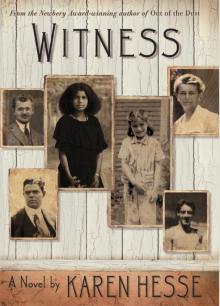 Witness
Witness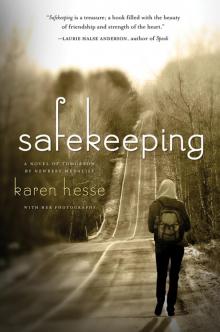 Safekeeping
Safekeeping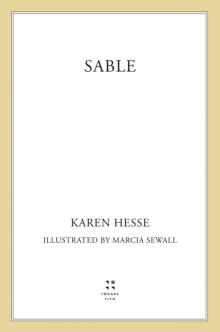 Sable
Sable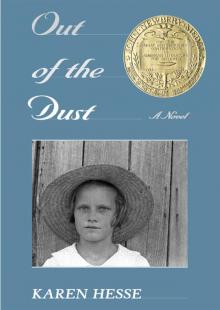 Out of the Dust
Out of the Dust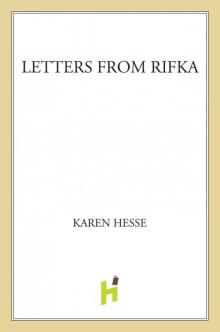 Letters From Rifka
Letters From Rifka The Music of Dolphins
The Music of Dolphins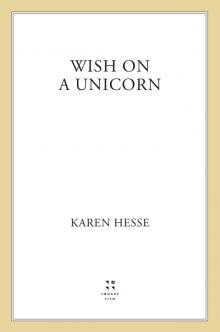 Wish on a Unicorn
Wish on a Unicorn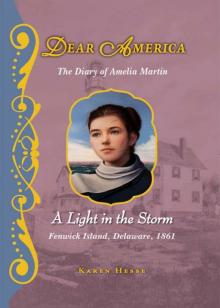 A Light in the Storm
A Light in the Storm